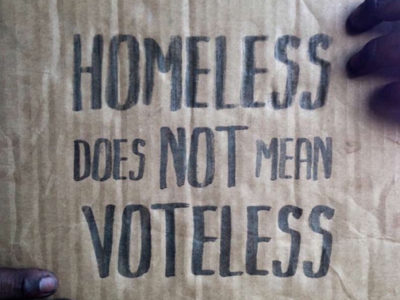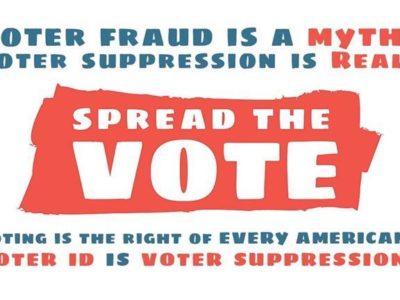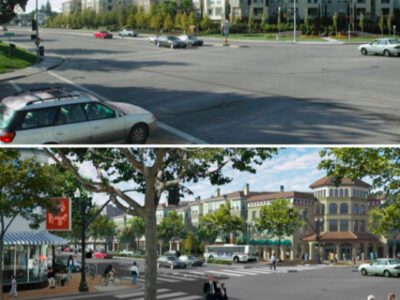Can Voter Registration Combat NIMBYism?
Homeless Voting Can Change the Urban Political Calculus
 NIMBY land use politics stems from a classic political process failure: the people who would benefit from more housing do not yet live in the jurisdiction where it will be built — and for the most part, do not even know that they will be the ones who will live there. Thus, local officeholders have few political incentives to take any risk to approve it.
NIMBY land use politics stems from a classic political process failure: the people who would benefit from more housing do not yet live in the jurisdiction where it will be built — and for the most part, do not even know that they will be the ones who will live there. Thus, local officeholders have few political incentives to take any risk to approve it.
This problem is augmented significantly when it is a question of affordable housing: for-profit developers can at least provide substantial campaign contributions, but affordable developers usually lack such deep pockets, and while expensive market-rate development might at least have some property tax benefits to local jurisdictions, affordable housing is much less likely to do so. Add to this the fears that having “those people” in the neighborhood will depress property values and bring crime, and you can see the problem. Little wonder that states have often moved to pre-empt local land use authority, whether it be Massachusetts’ Anti-Snob Zoning law, California’s Housing Element and more recent, more direct efforts at pre-emption, or New Jersey’s Mount Laurel doctrine. And also more recently, the new “YIMBY” movement has sought to upend the ways in which urban dwellers view housing development in general.
But I recently saw another development, not usually thought of in the NIMBY context, that might mean something.
 I am going to be spending the majority of my summer volunteering in North Carolina for Spread The Vote, a one-year-old organization that arose as a reaction to strict voter IDs laws designed to suppress the vote. Spread The Vote works with community-based organizations such as African-America churches, homeless shelter, food pantries, senior centers, domestic violence shelters, etc. to find potential voters who cannot vote because of ID requirements. Its volunteers do the leg work (and the grunt work) to get these potential voters IDs (including paying for the ID documents), then stay in touch with them, and get them to the polls.
I am going to be spending the majority of my summer volunteering in North Carolina for Spread The Vote, a one-year-old organization that arose as a reaction to strict voter IDs laws designed to suppress the vote. Spread The Vote works with community-based organizations such as African-America churches, homeless shelter, food pantries, senior centers, domestic violence shelters, etc. to find potential voters who cannot vote because of ID requirements. Its volunteers do the leg work (and the grunt work) to get these potential voters IDs (including paying for the ID documents), then stay in touch with them, and get them to the polls.
Great. It’s perhaps the most important thing we can do to resist massive voter suppression.
But I have just found out that Spread The Vote is launching a chapter in my home town of Los Angeles. That seems odd. California doesn’t have Voter ID laws. What’s going on.
Well, the City of Angels is the homelessness capital of the country — nearly 55,000 according to some estimates. if we are serious about enfranchising the poor, explained Spread The Vote founder Kat Calvin to me, then we must work here. Campaigns for registering the homeless are developing throughout the nation.
And that got me to thinking that this might have a real impact on overly restrictive land use policies. If the NIMBY problem is at least to some extent a question of spatial mismatch, then registering the homeless could make a dent. At least in California, the homeless do not have to have a mailing address in order to register, which theoretically means that they could register in different council districts — including those with the greatest NIMBY resistance to housing for the homeless. This could conceivably change the political calculus beforehand: it would certainly be an incentive for the homeless to encamp in those areas where the residents are the most resistant to affordable housing development so that they could register there.
Recently, in the Sherman Oaks district of Los Angeles, NIMBY residents packed a community meeting to protest Permanent Supportive Housing next to the confluence of two freeways where no wants to live: “I’m proposing maybe you build a reservation for these homeless somewhere out it the desert with all the help that can be given,” said one homeowner. “When we interned the Japanese during the second World War, we didn’t intern them in the city.”
That homeowner should perhaps discover that he no longer has a voting monopoly in regard to his Councilmember. Registering the homeless might be a way for him to find out.
Reader Comments
4 Replies to “Can Voter Registration Combat NIMBYism?”
Comments are closed.






“At least in California, the homeless do not have to have a mailing address in order to register, which theoretically means that they could register in different council districts — including those with the greatest NIMBY resistance to housing for the homeless. This could conceivably change the political calculus beforehand: it would certainly be an incentive for the homeless to encamp in those areas where the residents are the most resistant to affordable housing development so that they could register there.”
Great idea. What do we need to do to pull it off? Let’s begin the revolution!
Sign up with Spread The Vote!!: https://www.spreadthevote.org/
Prof. Zasloff, Thank You for your dedication to “Spread The Vote” at a time when our Democracy is being threatened by all three branches of government – Presidential, Congressional and SCOTUS.
The Power of Money, that controls far too many in Washington, is becoming the greatest threat to our Democracy since the Civil War, including your comment: “for-profit developers can at least provide substantial campaign contributions.”
We desperately need many more intellectuals like you to inform, educate and motivate We The People to Fight for Democracy, and the Human Race, because inequalities and climate change disasters are destroying our opportunities for survival faster today than ever before.
As Will and Ariel Durant concluded, after 40 years of historical research:
When a civilization declines, it is through no mystic limitation of a corporate life, but through the failure of its political or intellectual leaders to meet the challenges of change.” And our politicians are controlled by the Power of Money, which is the greatest threat to our Democracy today. Thus we shall rise or fall depending on whether intellectuals like yourself can join together to protect and perpetuate an acceptable quality of life for all future generations.
Another strategy this suggests is to have (future) occupier/owner cooperative corporations develop the properties, which would then be owned by the owner/occupiers (at least in part). This eliminates the need for a for-profit developer to maximize his return by building McMansions. This also has favorable implications as regard financing.
This strategy may not be applicable to traditional homeless people, but it would be useful for Google employees who are living in their cars in the Google parking lot or renting a garage of a house in Fremont.